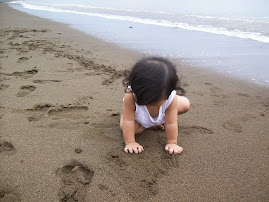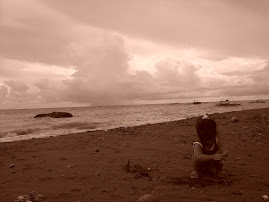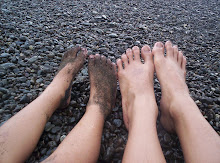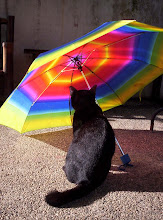Tell the world who she is.
I saw this poster in a bookstore in 2008. I wrote about my mother and sent it, and I was hoping I would get an acknowledgment in print that I could give my mother as a birthday gift.
She got more than that. My entry won my mother a place at the 5th Working Mom Balance Awards, alongside Senator Pia Cayetano, Pinky Yee of Goldilocks, Dr. Rosalinda Hortaleza of Splash Corporation, and Atty. Gaby Concepcion, among others. The awards night was held at Blue Leaf in The Fort, with celebrities and politicians in the audience. The Philippine Star article for the event is here.
She did not know about the award. An aunt dressed her up for the event and told her they were going to a photo session. We got a van-load of her friends who travelled six hours from Quezon Province to get to The Fort. For that one night, this public school teacher was a celebrity. But all my life, I guess this public school teacher has always been my celebrity. She is my mother.
This is what I wrote for her:
I hear the word “mother” and the image that immediately comes to my mind is a crying child running to his mother for comfort over a scraped knee. We look to our fathers for protection against the playground bullies, but we seek our mothers for hugs and kisses. Because we are raised in the notion that mothers are there to comfort and to nurture, we do not often see the spunk and the fire.
My mother is no different. When I was growing up, I thought she was the gentlest soul that ever lived. I have never heard her raise her voice in anger, she has never quarreled with anyone in public, and she has never hurt her children with her hands or her words. I was raised to fear my father’s spankings, but I tried so hard to behave because I was more afraid of disappointing my mother.
It changed somewhat when I got older. She separated with my father when I was in college, and I wondered if she gave up so easily. I thought she was weak because she hated confrontations. I also did not want to become a teacher like her, because I remember her laboring over her lesson plans by lamplight at night and despairing about the meager salary.
I never really knew the stuff that my mother was made of. That was, until Typhoon Winnie hit the Philippines on November 29, 2004.
On that day, my mother was going back to Infanta, Quezon after a weekend with us in Manila. We knew there was a typhoon, but we did not have an idea how hard it would hit the provinces. We received text messages that night from my husband’s family that landslides had occurred in Real, Quezon. All throughout the following day, we kept receiving pleas for help, saying that the water was rising, that the living, the dying and the dead were all huddled together, that there was no food or water. Our calls could not get through. Apparently, our text messages were not received either.
Real, Infanta, and Gen. Nakar in Quezon Province were among the hardest-hit towns in Quezon Province. You would recall the story of Repador building in Real, where over a hundred people took shelter at the height of the typhoon and were buried in a landslide. My grandparents lived two houses away from the Repador building. They were missing, along with most of our relatives. There was no word of my mother.
Since radio reports were very sketchy, my husband and brother left for Real on the second day. Thirty kilometers from Real, the road ended. They had to climb boulders, detour to the beach, and wade in waist-deep mud to go on. There were plenty of people on foot, trying to reach Real and Infanta to search for their families. In an equally large number were people going in the opposite direction, trying to get as far away from the place as possible, all muddy and wet, carrying children and meager belongings, their faces filled with shock.
They returned to Manila on the fourth day, bruised and limping. By then, relief operations were being organized and aid was finally trickling in. Soldiers had already arrived to help with the excavation of the Repador building. We learned that both of my grandparents were in Repador, and they had died along with thirteen other relatives. We also learned that my mother was alive, but we did not know where she was, if she was hurt or in need of help.
On December 10 we set out for Infanta to look for my mother. We reached Real just as Stella Marie Sor, three years old, was being lifted from the ruins of the Repador building. Stella Marie, her grandmother, and two teenage boys were the only survivors after ten days in the collapsed building. They survived on rainwater seeping through the debris. Stella Marie is my niece, and she is as old as my daughter.
Infanta was filled with thigh-high mud. You slipped when you wore slippers, but you stepped on sharp objects when you were barefoot. The one-storey houses had mud marks up to their roofs. Overturned vehicles lay in the rice paddies that had become mud rivers. Gigantic logs were on top of some of the houses. A single tomato cost ten pesos and no one had had fresh bread for several days.
If you search “Repador” in Google Philippines, the third entry comes from the Department of Education website. It is a first-hand account written by a teacher when the floods hit Infanta that night and what happened in the aftermath of the tragedy. The author is my mother. She was rescued by neighbors when the floodwaters rose. When we saw her in Infanta her bruises were only starting to fade in multicolored hues. She could not speak then of all that she had gone through, but she later wrote about it. She did not know we would come for her.
She thought she would die. Before the neighbors could hoist her up to their house’s second-floor terrace, she made sure that the two girls staying with her were safe. She knew how to swim, but the current was too fast, she was hit by logs under the water, and she was weakening. In the dark, she said she thought of her children and decided to fight.
She lost all her belongings in the flood. She also lost her parents and thirteen other relatives. But when we arrived in Infanta on that day, she was digging up around her collapsed house, drying old family pictures in the slight breeze, finding a spoon here and a pot there. She was so determined to pick up as many pieces of her life as she could, and start anew.
After the flood, we have repeatedly asked my mother to move to Manila with us. She refused, saying that there was work to be done and that her school needs her. The first thing she did when the water subsided was to find a way to get to her school, to see what needs to be done.
My mother was the principal of Alitas Elementary School in Infanta. The school was badly damaged. Since the water during the flood reached almost to the roofs of the classrooms, all the books were ruined, the students’ desks were broken, and the offices were unrecognizable. Worse, their only source of water, a deep well, was buried in mud.
My mother rallied her teachers and met with the parents. They organized a cleaning and repair schedule that would take weeks. Since the school was far from the town proper, it would not immediately receive aid from the local government. So she became creative.
She wrote about her experience as a report and submitted it to the Department of Education. She solicited help from private organizations.
In January 2005, barely two months after the flood, officers of FEU – East Asia College in Manila arrived in Alitas Elementary School, bringing donations of books, school supplies for the children, computers, and financial help to install pipes to supply potable water to the school. Her school became the first recipient in the area of any substantial aid from an organization.
She went further. She got in touch with a rotary club in Australia and requested for pledges to have her library built. She asked prospective donors to visit the school and see for themselves what they could do to help. She organized little beauty pageants to raise funds and recruited parent volunteers to get actively involved in rebuilding the school. She haggled with the division offices for funds. And the school was slowly restored.
My mother is now 58 years old; in two years’ time she could retire. But still she insists that the school needs her. The library has to be filled with new books; three classrooms need new roofs. There are PTA meetings to chair, contests to organize, requests for sponsorship to type.
I did not fully realize the strength of my mother’s character. This diminutive, soft-spoken mother whom I regarded as the most disorganized woman in the planet has managed, by sheer force of will, to turn a personal tragedy into a driving force to contribute to her community. I look at her, complaining that she has nothing to wear from a closet full of clothes, and I have to marvel at the tough side of her I did not know existed. She sits quietly while I argue with her, and I wonder how many arguments she won for the sake of the school she helped rebuild.
When I was thirteen, I wrote my mother a poem. Part of it goes:
Do you remember, Mommy,
When you taught me to live, and love
The best way I know how?
I remember, Mommy,
So I live in your example,
And love you
With the best of me.
It does not come any truer than this.
My mother is no different. When I was growing up, I thought she was the gentlest soul that ever lived. I have never heard her raise her voice in anger, she has never quarreled with anyone in public, and she has never hurt her children with her hands or her words. I was raised to fear my father’s spankings, but I tried so hard to behave because I was more afraid of disappointing my mother.
It changed somewhat when I got older. She separated with my father when I was in college, and I wondered if she gave up so easily. I thought she was weak because she hated confrontations. I also did not want to become a teacher like her, because I remember her laboring over her lesson plans by lamplight at night and despairing about the meager salary.
I never really knew the stuff that my mother was made of. That was, until Typhoon Winnie hit the Philippines on November 29, 2004.
On that day, my mother was going back to Infanta, Quezon after a weekend with us in Manila. We knew there was a typhoon, but we did not have an idea how hard it would hit the provinces. We received text messages that night from my husband’s family that landslides had occurred in Real, Quezon. All throughout the following day, we kept receiving pleas for help, saying that the water was rising, that the living, the dying and the dead were all huddled together, that there was no food or water. Our calls could not get through. Apparently, our text messages were not received either.
Real, Infanta, and Gen. Nakar in Quezon Province were among the hardest-hit towns in Quezon Province. You would recall the story of Repador building in Real, where over a hundred people took shelter at the height of the typhoon and were buried in a landslide. My grandparents lived two houses away from the Repador building. They were missing, along with most of our relatives. There was no word of my mother.
Since radio reports were very sketchy, my husband and brother left for Real on the second day. Thirty kilometers from Real, the road ended. They had to climb boulders, detour to the beach, and wade in waist-deep mud to go on. There were plenty of people on foot, trying to reach Real and Infanta to search for their families. In an equally large number were people going in the opposite direction, trying to get as far away from the place as possible, all muddy and wet, carrying children and meager belongings, their faces filled with shock.
They returned to Manila on the fourth day, bruised and limping. By then, relief operations were being organized and aid was finally trickling in. Soldiers had already arrived to help with the excavation of the Repador building. We learned that both of my grandparents were in Repador, and they had died along with thirteen other relatives. We also learned that my mother was alive, but we did not know where she was, if she was hurt or in need of help.
On December 10 we set out for Infanta to look for my mother. We reached Real just as Stella Marie Sor, three years old, was being lifted from the ruins of the Repador building. Stella Marie, her grandmother, and two teenage boys were the only survivors after ten days in the collapsed building. They survived on rainwater seeping through the debris. Stella Marie is my niece, and she is as old as my daughter.
Infanta was filled with thigh-high mud. You slipped when you wore slippers, but you stepped on sharp objects when you were barefoot. The one-storey houses had mud marks up to their roofs. Overturned vehicles lay in the rice paddies that had become mud rivers. Gigantic logs were on top of some of the houses. A single tomato cost ten pesos and no one had had fresh bread for several days.
If you search “Repador” in Google Philippines, the third entry comes from the Department of Education website. It is a first-hand account written by a teacher when the floods hit Infanta that night and what happened in the aftermath of the tragedy. The author is my mother. She was rescued by neighbors when the floodwaters rose. When we saw her in Infanta her bruises were only starting to fade in multicolored hues. She could not speak then of all that she had gone through, but she later wrote about it. She did not know we would come for her.
She thought she would die. Before the neighbors could hoist her up to their house’s second-floor terrace, she made sure that the two girls staying with her were safe. She knew how to swim, but the current was too fast, she was hit by logs under the water, and she was weakening. In the dark, she said she thought of her children and decided to fight.
She lost all her belongings in the flood. She also lost her parents and thirteen other relatives. But when we arrived in Infanta on that day, she was digging up around her collapsed house, drying old family pictures in the slight breeze, finding a spoon here and a pot there. She was so determined to pick up as many pieces of her life as she could, and start anew.
After the flood, we have repeatedly asked my mother to move to Manila with us. She refused, saying that there was work to be done and that her school needs her. The first thing she did when the water subsided was to find a way to get to her school, to see what needs to be done.
My mother was the principal of Alitas Elementary School in Infanta. The school was badly damaged. Since the water during the flood reached almost to the roofs of the classrooms, all the books were ruined, the students’ desks were broken, and the offices were unrecognizable. Worse, their only source of water, a deep well, was buried in mud.
My mother rallied her teachers and met with the parents. They organized a cleaning and repair schedule that would take weeks. Since the school was far from the town proper, it would not immediately receive aid from the local government. So she became creative.
She wrote about her experience as a report and submitted it to the Department of Education. She solicited help from private organizations.
In January 2005, barely two months after the flood, officers of FEU – East Asia College in Manila arrived in Alitas Elementary School, bringing donations of books, school supplies for the children, computers, and financial help to install pipes to supply potable water to the school. Her school became the first recipient in the area of any substantial aid from an organization.
She went further. She got in touch with a rotary club in Australia and requested for pledges to have her library built. She asked prospective donors to visit the school and see for themselves what they could do to help. She organized little beauty pageants to raise funds and recruited parent volunteers to get actively involved in rebuilding the school. She haggled with the division offices for funds. And the school was slowly restored.
My mother is now 58 years old; in two years’ time she could retire. But still she insists that the school needs her. The library has to be filled with new books; three classrooms need new roofs. There are PTA meetings to chair, contests to organize, requests for sponsorship to type.
I did not fully realize the strength of my mother’s character. This diminutive, soft-spoken mother whom I regarded as the most disorganized woman in the planet has managed, by sheer force of will, to turn a personal tragedy into a driving force to contribute to her community. I look at her, complaining that she has nothing to wear from a closet full of clothes, and I have to marvel at the tough side of her I did not know existed. She sits quietly while I argue with her, and I wonder how many arguments she won for the sake of the school she helped rebuild.
When I was thirteen, I wrote my mother a poem. Part of it goes:
Do you remember, Mommy,
When you taught me to live, and love
The best way I know how?
I remember, Mommy,
So I live in your example,
And love you
With the best of me.
It does not come any truer than this.






























